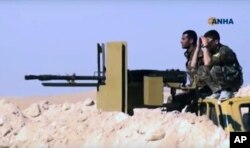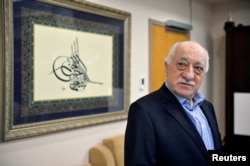U.S. President Donald Trump spoke by telephone Tuesday with his Turkish counterpart, Recep Tayyip Erdogan, and the White House described the 45-minute conversation as productive.
The call came amid controversy over Trump's order of a temporary travel ban on seven Muslim majority countries in which terrorist groups operate.
Erdogan is usually among the first to speak out against perceived injustices against Muslims and Islamophobia. Analysts say this time he was uncharacteristically quiet about the travel ban controversy.
"This deafening silence about Trump. If I were a fan of his, I would have said disappointing, heart breaking,” observed International relations expert Soli Ozel of Istanbul Kadir Has University. “But it is pretty obvious they don't want to be cross with Trump, there are expectations from Trump. And with Trump you know he would reciprocate. That's why the silence."
One of Erdogan's key expectations is the end of U.S. military support to the Syrian Kurdish group the PYD. Its militia, the YPG, is currently leading the fight to capture the Syrian city of Raqqa, the self-declared capital of the Islamic State group.
Last month the Pentagon supplied military vehicles to a coalition including the YPG. The move caused alarm in Ankara, as it accuses the Syrian Kurdish group of being affiliated with the Kurdistan Workers' Party (PKK), which is fighting the Turkish government for greater minority rights.
"If this U.S. administration in its early days decides to supply these weapons to the PYD, that will surely be seen as a non-friendly message to Ankara,” warned analyst Sinan Ulgen of the Carnegie Institute in Brussels. “And also be important to understand how the bilateral relation will evolve."
Turkish presidential sources quoted in local media claim both leaders agreed to cooperate in the battle to capture Raqqa and the Syrian town of al-Bab, which Turkish forces are engaged in fighting to recapture from Islamic State. The same sources also claim CIA Director Mike Pompeo will soon visit Turkey.
Analysts predict any final decision by Washington on the PYD will likely depend, at least in part, on a review of the fight against Islamic State being carried out by the Pentagon, which is still several weeks away from completion.
Reportedly also on the agenda of the CIA director's visit is U.S.-based cleric Fethullah Gulen. Ankara is demanding Gulen’s extradition, accusing him of using his followers to carry out a failed coup last July, a charge he denies.
Experts warn any extradition is ultimately a matter for the courts and will likely take months, if not years, with an uncertain outcome. Ankara is also pressing for Gulen’s detention, as well as cooperation in curtailing or monitoring the activities of his followers and vast business network.
With U.S. military planes using Turkish airbases, including Incirlik, in the war against Islamic State, analysts suggest Ankara does have some leverage with Washington, albeit limited.
“What you can do, is you can close Incirlik. There are some loose mouths within the government that say we can consider this,” noted international relations expert Ozel. “Well let's say you become the eighth county on the (travel ban) list. Can you really risk that happening. Which means you have to really remain within reason and really not bluff, and Turkey and United States do have common interests,” he said.
Iran is one of those shared interests, given Erdogan has expressed Trump’s concern over Tehran’s rising hegemony, albeit in less colorful language. “Turkey will be happy with anything that counterbalances Iran,” predicts political columnist Semih Idiz of Al Monitor website. “But it would not actively engage or be seen to be engaging in those activities, as the two countries try hard to maintain a relationship.”
Given Turkey has strained relations not only with Iran, but also with its other southern neighbors Syria and Iraq, coupled with growing concerns over Russia’s intentions, analyst Ulgen argues Ankara is banking on a resetting of relations with Washington to reverse its growing isolation.
“That would certainly help Turkey to reacquire more influence in the region. That is the big uncertainly now. Because if the relationship with the U.S. does not improve as deeply as Ankara initially expected that would also weaken Turkey’s position within the region,” he said.






